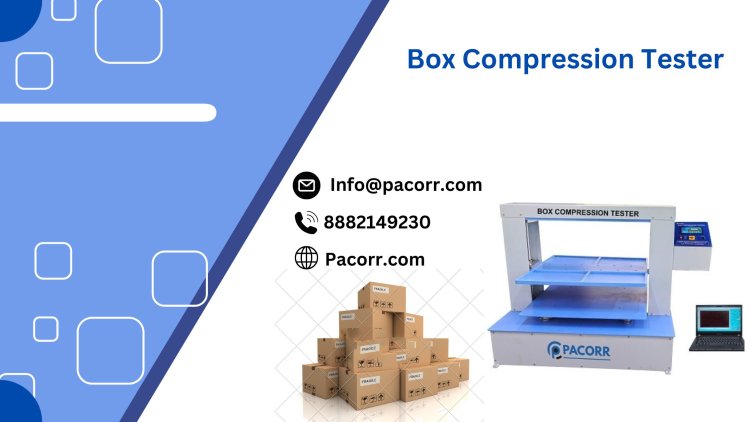The Ultimate Guide to Box Compression Tester Ensuring Packaging Strength and Reliability
A Box Compression Tester is a specialized instrument designed to measure the compressive strength of boxes and other packaging materials.
Share this Post to earn Money ( Upto ₹100 per 1000 Views )

What is a Box Compression Tester?
A Box Compression Tester is a specialized instrument designed to measure the compressive strength of boxes and other packaging materials. It simulates the forces that packaging may encounter during stacking and handling, ensuring that the packaging is strong enough to protect its contents. The data obtained from these tests help manufacturers enhance packaging design, select appropriate materials, and comply with industry standards.
Importance of Box Compression Testing
Quality Assurance: Ensuring that packaging can withstand compression forces is crucial for maintaining product quality. Weak packaging can lead to product damage, resulting in financial losses and customer dissatisfaction.
Compliance: Many industries have specific standards for packaging strength. Box compression testing helps manufacturers comply with these standards, ensuring that their products can be safely transported and stored.
Cost Efficiency: By optimizing packaging design and materials based on compression test results, manufacturers can reduce material costs while maintaining packaging integrity.
Environmental Impact: Testing helps in designing packaging that uses fewer materials without compromising strength, thus contributing to environmental sustainability.
How Does a Box Compression Tester Work?
A Box Compression Testing typically consists of a test platform, a compression plate, and a load cell. Here’s a step-by-step process of how it works:
· Preparation: The box or package to be tested is placed on the test platform.’
· Compression: The compression plate moves downwards, applying force to the top of the box.
· Measurement: The load cell measures the force applied to the box until it deforms or collapses.
· Data Analysis: The test results are recorded and analyzed to determine the compressive strength of the box.
Features of a Box Compression Tester
High Precision Load Cell: Ensures accurate measurement of compression forces.
1. Digital Display: Provides real-time data and easy-to-read results.
2. Adjustable Test Speed: Allows for varying test speeds to simulate different stacking conditions.
3. Data Logging: Enables recording and analysis of test results over time.
4. User-friendly Interface: Simplifies the testing process with intuitive controls.
Benefits of Using a Box Compression Tester
· Improved Packaging Design: Helps in designing packaging that offers better protection.
· Cost Savings: Reduces material wastage and optimizes packaging costs.
· Enhanced Product Safety: Ensures that products reach consumers in perfect condition.
· Compliance and Certification: Aids in meeting industry standards and certifications.
Applications of Box Compression Testing
1. Corrugated Boxes: Widely used in shipping and storage, corrugated boxes must withstand significant compressive forces.
2. Plastic Containers: Used in various industries, these containers need to be tested for their strength and durability.
3. Folding Cartons: Common in retail packaging, folding cartons require compression testing to ensure they can protect lightweight products.
4. Fiber Drums: Used for bulk packaging, these drums need to maintain integrity under compression.
Conclusion
Box Compression Tester are indispensable tools for packaging manufacturers. They ensure that packaging can withstand the stresses of stacking and handling, thereby protecting the products inside. By investing in a high-quality Box Strength Tester, manufacturers can achieve better packaging performance, reduce costs, and enhance customer satisfaction. Pacorr offers reliable and advanced Box Compression Tester that meet industry standards and provide precise results, making them an excellent choice for any packaging testing needs.
FAQs About Box Compression Tester
Q1: What is the primary function of a Box Compression Tester?
A1: The primary function of a Box Compression Tester is to measure the compressive strength of packaging materials, ensuring they can withstand stacking and handling forces.
Q2: How does box compression testing improve packaging design?
A2: By analyzing the test results, manufacturers can optimize packaging materials and design to enhance strength and durability while reducing costs.
Q3: Can a Box Compression Tester be used for all types of packaging?
A3: Yes, Box Compression Tester Price can be used for various types of packaging, including corrugated boxes, plastic containers, folding cartons, and fibre drums.
Q4: What features should I look for in a Box Compression Tester?
A4: Key features to look for include a high precision load cell, digital display, adjustable test speed, data logging capabilities, and a user-friendly interface.
Q5: Why is compliance important in packaging testing?
A5: Compliance with industry standards ensures that packaging can protect products effectively, preventing damage and financial losses during transportation and storage.
For more information about our Box Compression Testers and other packaging testing solutions, visit Pacorr.com

 pacorrtesting1
pacorrtesting1 















